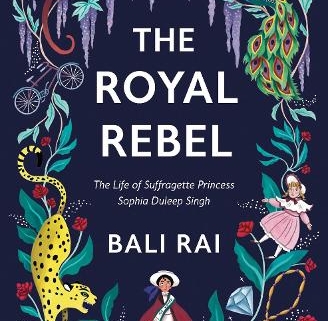The Royal Rebel by Bali Rai
Bringing to life the story of a refugee who deserves more recognition, Bali Rai introduces new readers to the Sufragette Princess Sophia Duleep Singh. Read on for a guest post from Bali Rai about his latest book.
For most people of my heritage, the Duleep Singh story is widely known. They are a core element of Sikh culture and history. More accurately, stories of Maharajah Duleep Singh, and his father, Maharajah Ranjit Singh, are. My maternal grandfather idolised Ranjit Singh, fearless ruler and Lion of the Punjab. He also raged at the misfortunes of Duleep Singh, the boy from whom the British stole the once mighty Sikh Empire. Here were two men; the brave and wise forebear, and the ill-fated and troubled heir.
Not once, as a child, did I hear of Sophia Duleep Singh. That recognition arrived when teenage curiosity led me to her via research into Indian Independence. Years later, having written several tales of forgotten or lost voices from British Indian history, I was presented with the chance to bring Sophia’s life to younger readers. Yet, very few people in my family had heard of her. In my family’s version of British rule and eventual independence, hers was, at best, a supplementary role.
Nor did I hear of her in school. Understandable, I guess, when the curriculum extolling British victories in two world wars overlooked the vital role played by colonised peoples from across the globe. Mainstream history books whitewashed those gallant efforts, those sacrifices, and the many lost lives. The Empire was all – those conquered and misruled no more than adjuncts to the real story of white British heroism. All of it hot air. I was taught that Britain stood alone. That was simply not true.
And Sophia’s life is just one of many that prove it. Born in England, goddaughter to Queen Victoria, Sophia led a charmed and privileged existence in many ways. Yet, underneath the aristocratic veneer, turmoil, tragedy, and a deep sense of disconnection turned this shy, quiet girl into a rebel. The Harridan of Hampton Court, as she was once described.
Sophia’s father was a child when the British stole his birth right and brought him to Queen Victoria’s court. His life was spent agonising over a lost empire. Bankrupt, drunk, and estranged from both of his families, he died angry and alone in Paris. By this time, Sophia had lost her mother, her youngest brother, and any sense of belonging. Her elder sisters had their own lives, her elder brothers, too – and all but one of her siblings and step-siblings died before her. Tragedy and loss shaped her. As did her sense of disconnection. She was a refugee, adrift in the country of her birth, and not quite Indian enough to ever feel truly Indian.
Instead, she was captivated by the idea of a free India, aided stranded Indian Lascars on London’s poverty and disease riddled docks, and served as a nurse during the Great War. And when she finally found a new family, the Suffragettes, she devoted herself to their cause. Indeed, Sophia was a prominent suffragette from 1908 onwards. She counted Emmeline, Sylvia and Christabel Pankhurst, Elizabeth and Louisa Garrett Anderson, Una Dugdale and Evelina Haverfield as close friends and comrades. All of those white British women (amongst many) were stars of the Suffragette movement. Sophia was every bit as significant, every bit as dedicated, and yet her story faded.
Retelling Sophia’s tale for younger readers is a huge honour. Not just because of what she achieved, but also for what she represents. British history has never been about one race, one culture, or one ethnicity. Britain has never stood alone. People from across the world have shaped every aspect of our history. If we acknowledge one group, why leave any other group unacknowledged? What purpose does it serve to present our children with a whitewashed version of our shared story?
None whatsoever.







Leave a Reply
Want to join the discussion?Feel free to contribute!